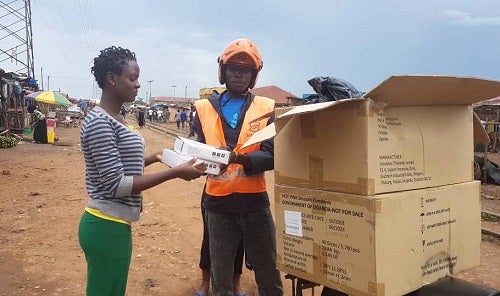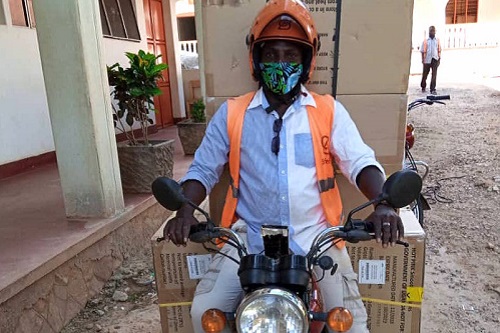News
Ride-hailing app delivers contraceptives to users’ doorsteps
- 17 July 2020
News
KAMPALA, Uganda – When Betty Nagadya walks through the trading centre on her way home, she sings a song in the local Luganda language: “SafeBoda, SafeBoda, who needs a helmet?” she sings. “For those who feel cold, I have a coat for you.” But her song is not about clothing – it’s about condoms.
Ms. Nagadya is a village health team volunteer. She distribute condoms in her community in partnership with the motorcycle taxi company SafeBoda, all as part of the response to the COVID-19 pandemic.
Under Uganda’s COVID-19 lockdown, contraceptives and other reproductive health supplies – such as HIV tests, pregnancy tests and mama kits, which contain the supplies for clean, safe childbirth – have been in short supply. But now these items can be ordered through the popular ride-hailing app SafeBoda, and they will be delivered directly to the individual’s doorstep.
Ms. Nagadya’s song helps raise awareness about this new service. And her openness invites community members to ask questions. Many do, especially young people.

“Many of them are still shy to talk about using condoms,” she said. “But when I sing my song, they understand what I mean, so they come and ask questions. I teach them how to use condoms and give them to them. I also go to houses where I know there are people who might need condoms,” she said.
Even before the pandemic, there was a need to expand access to sexual and reproductive health services and supplies. For instance, an estimated 19 per cent of women in Uganda want to prevent or delay pregnancy but are not using a method of contraception, according to recent reports.
The outbreak of COVID-19 has only compounded the situation. Supply chains interruptions and transport restrictions have limited the availability of a wide range of essential reproductive health supplies.
In response, UNFPA, together with health officials, Marie Stopes and SafeBoda, with financial support from the Embassy of Sweden in Uganda, created an e-shop where individuals can order the products they need. By making the e-shop available via the widely used SafeBoda app, organizers were able to reach an extensive user base.
When a user requests an item, the app identifies the nearest pharmacy within a 7 kilometre radius where the item is in stock. A SafeBoda driver then picks up the item and delivers it to the user.
SafeBoda drivers also deliver reproductive commodities to local health centres – where health team members like Ms. Nagadya collect them for distribution – helping to fill gaps in the supply chain.
Most of the e-shop’s reproductive health items shop are subsidized and inexpensive. Free government-provided condoms can also be ordered. All delivery charges have been waived during the pandemic period. The service will continue post-COVID-19, for a nominal delivery fee.

The service is now up and running in the populous Kampala and Wakiso districts.
Users of the SafeBoda app say this new service is an important development, “especially [for] things we fear to order over the counter,” said Flora Peace, from Nansana. “I am sure most people are excited about this.”
Many drivers are also happy about the development.
SafeBoda driver Moses Okanya, 25, has been delivering boxes of condoms to St Francis Hospital in Kakiri. He says this new responsibility is rewarding.
“I feel I have played a role to reach my fellow young people, because if the condoms are not in the hospital, then the young people are going to put themselves at risk. Making the condoms available to them is something I am proud of,” he said.
Mr. Okanya takes precautions to prevent the spread of COVID-19 while working, diligently wearing a mask and using hand sanitizer. At the same time, he wants to make sure the COVID-19 crisis does not lead to the neglect of people’s other health needs. “We may put more emphasis on COVID-19, and then we are losing people from other diseases which have been there before,” he said.
Now is the time to consider new solutions to longstanding problems, UNFPA’s representative in Uganda, Alain Sibenaler, said.
“We have had to rethink and become more innovative in reaching young people and women with sexual and reproductive health-related information and services," he said.
– Martha Songa, Cedric Muhebwa and Rakiya Abby-Farrah